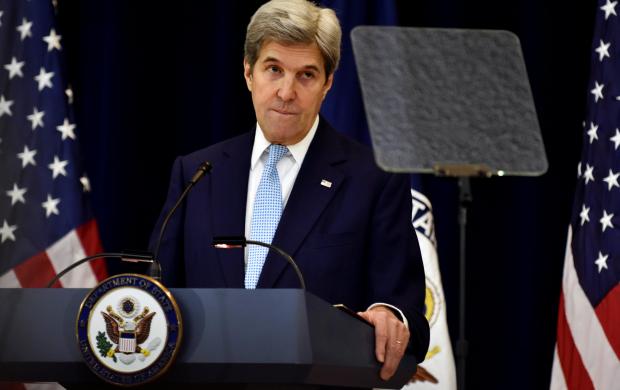
U.K. Prime Minister Theresa May criticized outgoing Secretary of State John Kerry for his condemnation of Israeli policy, saying he focused too much on the issue of settlements and shouldn’t have attacked the political make-up of an ally’s elected government.
May’s comments, which were met with surprise from the State Department, come as the U.K. starts fostering ties with the incoming administration of Donald Trump, who has slammed President Barack Obama’s foreign policy and promised more support for Israel.
Kerry said Benjamin Netanyahu’s government was the “most right-wing” in Israel’s history and its settlement-building runs counter to its stated support for a two-state solution. His comments, in a speech on Wednesday, came after the U.S. took the unusual step of not using its veto to block a United Nations Security Council resolution condemning Israeli construction on land in the West Bank which would form part of any future Palestinian state. Britain, which has long opposed the settlements, voted for the resolution.
“We do not believe that it is appropriate to attack the composition of the democratically elected government of an ally,” May’s office said in an emailed statement late Thursday. “We are also clear that the settlements are far from the only problem in this conflict. In particular, the people of Israel deserve to live free from the threat of terrorism, with which they have had to cope for too long.”
Kerry made clear in his comments that stumbling blocks to peace run deeper than the building of settlements, but said Netanyahu has a choice between pursuing a two-state solution or continuing building on land in the West Bank and abandoning democracy in Israel.
“His current coalition is the most right-wing in Israeli history, with an agenda driven by the most extreme elements,” Kerry said in what is expected to be his last major intervention on the subject before Trump becomes president next month. “Let me emphasize, this is not to say that the settlements are the whole or even the primary cause of this conflict. Of course they are not. Nor can you say that if the settlements were suddenly removed, you’d have peace. Without a broader agreement, you would not.”
“There are a similar number of Jews and Palestinians living between the Jordan River and the Mediterranean Sea,” Kerry said. “They have a choice. They can choose to live together in one state, or they can separate into two states. But here is a fundamental reality: if the choice is one state, Israel can either be Jewish or democratic — it cannot be both — and it won’t ever really be at peace.”
Britain continues to back a two-state solution and the government continues “to believe that the construction of settlements in the occupied Palestinian territories is illegal,” May’s office said in the statement. “The government believes that negotiations will only succeed when they are conducted between the two parties, supported by the international community.”
The State Department pushed back against May’s response to Kerry’s speech and pointed to support from other countries for its central arguments.
“We are surprised by the U.K. Prime Minister’s office statement given that Secretary Kerry’s remarks –which covered the full range of threats to a two-state solution, including terrorism, violence, incitement and settlements –were in line with the U.K.’s own longstanding policy and its vote at the United Nations last week,” the department said in a statement. “We are grateful for the strongly supportive statements in response to Secretary Kerry’s speech from across the world, including Germany, France, Canada, Jordan, Egypt, Turkey, Saudi Arabia, Qatar, the United Arab Emirates and others.”
Featured Image:
(c) 2016, Bloomberg

